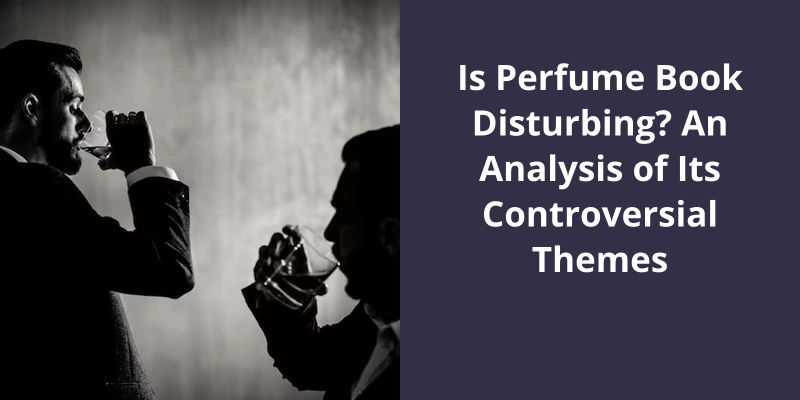Yes, the Perfume book can be considered disturbing by some readers. Authored by Patrick Süskind, the book explores dark and controversial themes such as obsession, murder, and the manipulation of human scent, which could be unnerving to some. Its protagonist, Jean-Baptiste Grenouille, is an anti-hero known for his unique olfactory sense and his extreme actions to create the perfect perfume. These actions include murder and disturbing displays of inhumanity. Furthermore, the book intricately explores the grim settings and raw emotions, which can leave readers feeling unsettled. Regardless of its disturbing elements, many still regard the book as a masterpiece for its unique narrative and rich sensory descriptions.

What Is the Setting of Perfume?
The setting of Perfume is intricately woven into the very fabric of the story itself. The eighteenth-century France of Grenouilles world is one of staggering wealth and brutal poverty, of delectable perfumes and putrid cesspools, of aristocratic arrogance and peasant misery. It’s a place where the dividing line between life and death, beauty and ugliness, is razor-thin and constantly blurred.
On the other hand, the fantastic elements of the story can make it difficult to fully identify with the characters and their struggles. Grenouilles ability to discern every scent in the world, for example, is a power beyond anything we mere mortals can imagine. His obsession with capturing and preserving the most exquisite scents he can find is both fascinating and horrifying, but it’s hard to truly empathize with someone whose motivations are so alien to our own.
For some, the books richly imagined world and extravagant plot will be a delight, a chance to escape into a colorful and captivating alternate reality. For others, it may feel distant and alienating, a strange and unfamiliar world that’s difficult to fully grasp. Either way, however, Perfume is a novel that demands attention and doesn’t easily let go.
The Significance of Scent in the Novel and It’s Cultural and Historical Context
Scent plays an important role in novels as it adds depth and complexity to the characters and their surroundings. Additionally, scents can also carry cultural and historical significance, as they may be associated with certain regions or time periods. Understanding the role of scent in a novel can provide greater insight into the characters and their environment, as well as the cultural and historical context in which the story is set.
However, perfume is more than just a luxury item as it’s become a part of our daily routines and can enhance our mood and confidence. In this article, we will delve deeper into the world of perfumes and explore their various benefits beyond just being a status symbol.
Is Perfume Considered a Luxury?
Even though they aren’t necessarily a necessity, perfumes have been an essential part of many peoples lives for centuries. From ancient Egyptians to modern-day consumers, perfumes have been used for a variety of reasons ranging from masking unpleasant odors to enhancing ones personal appeal.
Perfumes contain a blend of aromatic compounds, essential oils, and solvents that give off a unique scent. These fragrance notes could be floral, woody, spicy, or musky, evoking different emotions and moods in the wearer and the people around them. As such, perfumes have become a form of self-expression, a way to stand out in a crowd, and a tool for boosting ones confidence and mood.
However, not all perfumes are created equal, and some are more luxurious than others. High-end perfumes often come with ornate packaging, exotic ingredients, and famous brand names, carrying a hefty price tag to match. These fragrances are marketed towards affluent consumers who’re willing to pay a premium for exclusivity, prestige, and quality.
Despite the luxury status of high-end perfumes, there are also more affordable options available for budget-conscious consumers. Mass-market perfumes are sold in department stores, drugstores, and online retailers at a fraction of luxury perfume prices. These fragrances are designed to cater to a wider audience, with simple packaging and more accessible scent profiles.
In recent years, there’s been a shift towards more sustainable and ethical perfume production, as consumers become more conscious of their environmental footprint and social responsibility. Some perfume companies are using natural and organic ingredients, reducing packaging waste, and supporting fair labor practices.
Perfume Collecting and Hobbies: This Topic Looks at the Hobby of Perfume Collecting and How People Collect and Appreciate Fragrances. It Could Discuss the Different Types of Perfume Collectors, the Value of Rare and Vintage Fragrances, and the Cultural Significance of Perfume in the World of Hobbies.
- Types of perfume collectors
- Value of rare and vintage fragrances
- Cultural significance of perfume in the world of hobbies
Source: Why is Perfume So Expensive? 5 Things You Should Know!
The message of the movie “Perfume” goes beyond the traditional narrative of finding oneself; it strips the audience of their sense of smell, making them question their identity, desires, and values. The film preaches that scent is an integral part of what makes us individuals, and that owning a unique scent is the ultimate goal. But how far is one willing to go to achieve that goal, and what does it mean to sacrifice oneself for a scent? These are some of the questions that the movie dares to ask it’s viewers.
What Is the Message of the Movie Perfume?
So when we’re introduced to Jean-Baptiste Grenouille in the movie Perfume, we find ourselves in a world that’s otherwise occupied by blind individuals. The only sense that Grenouille has, that’s off the spectrum of his contemporaries, is his sense of smell. And with this, Grenouille is able to turn his life into a pursuit for the ultimate scent.
Through Grenouilles character, the message of the movie Perfume becomes clear. The movie is a visual representation of what it means to have an obsessive personality and to what extreme we could take our so-called “normal” qualities. Grenouille isn’t contented with being a normal person and having a normal smell. He’s only interested in creating a scent that’s unique to him. The audience can see his growth from an abandoned child to a street-perfumer to an apprentice perfumer with a quest to becoming the best perfumer ever lived.
What makes this movie dexterous in conveying it’s message is the fact that it isn’t a moral story – it isn’t preaching to it’s audience about the dangers of obsession or what a person should do when gripped by such a compulsion. It showcases how powerful our senses can be, and how we often take them for granted. It also heavily revolves around the themes of power, want, and desire.
Overall, the message of the movie Perfume can be seen in it’s portrayal of how an individuals obsessiveness can consume and lead them down a path of destruction. It’s thought-provoking and is one that could cause the audience to take a step back and think, not just about the sense of smell, but about how the smallest of things can drive us towards obsession. The climax of the movie is a testament to how our scents can represent a powerful thing, and it leaves you wondering how you could be special and unique, with something as mundane as smell.
Perfume has had a long and illustrious history, dating back thousands of years to ancient cultures like Egypt, Greece, and Rome. However, much of what we know about modern perfume can be traced back to the Enlightenment in France, a time of great cultural and artistic innovation. From the rise of the bourgeoisie to the legacy of Louis XIV, the historical context of perfume is deeply intertwined with the social, political, and economic forces that defined this period in French history.
What Is the Historical Context of Perfume?
At this time, France was the cultural and intellectual center of Europe. The Enlightenment, also known as the Age of Reason, was a time of great philosophical and scientific advances. Perfume, like other luxury goods, was highly valued during this time. People would use perfumes to signal their social status and wealth, and it became a symbol of refinement and elegance.
One of the most famous perfumers of this time was Jean-Baptiste Grenouille, the protagonist of Patrick Süskinds novel, “Perfume: The Story of a Murderer.”. In the novel, Grenouille is obsessed with capturing the perfect aroma, and goes to great lengths to create the ultimate scent. While the story is fictional, it reflects the importance of perfumes during this time in history.
Perfume became widely popular in France during the 18th century. The court of Louis XV was particularly fond of perfumes, and the king himself was known for his love of lavender water. Perfumes were also highly valued by women of the aristocracy, who’d scent their clothes and hair. The perfumes of this time were often very floral, and used ingredients like rose, jasmine, and orange blossom.
Because hygiene was not as advanced as it’s today, people would use perfumes to mask unpleasant odors. Perfume was also used in medicine, as essential oils were believed to have healing properties. Aromatherapy, or the use of scents to promote health and well-being, has it’s roots in this time period.
It’s no secret that we love our fragrances. But have you ever wondered if those delightful scents linger only on your skin or manage to seep into your bloodstream? Studies have shown that fragrance chemicals are capable of passing through the skin barrier and making their way into your bloodstream, posing potential health risks. So, let’s dive deeper into this topic and explore the science behind it.
Does Perfume Get Into Bloodstream?
There have been numerous studies done on the topic of whether or not perfume gets into the bloodstream. The general consensus among experts is that fragrance chemicals, like other toxic chemicals, can indeed pass from the skin and into the blood. This is why it’s important to be cautious about the types of perfumes and other fragrances that you use on your skin.
Many of the chemicals used to create different perfumes and fragrances are synthetic and potentially toxic. When these chemicals come into contact with the skin, they can be absorbed through the pores and travel into the bloodstream.
Once these fragrance chemicals are in the bloodstream, they can potentially cause a number of health problems.
Fortunately, there are some simple things you can do to avoid exposure to potentially harmful fragrance chemicals. This can help to reduce your overall exposure to dangerous chemicals and minimize the risk of health problems down the line.
Another important factor to consider is how often you use perfume or other fragrances. While most people enjoy smelling good, it’s important to use these products in moderation and never overuse them.
The Potential Health Effects of Fragrance Chemicals in the Bloodstream
Fragrance chemicals can potentially enter the bloodstream and may have unknown health effects.
Conclusion
It’s undeniable that the book Perfume is one that can leave a lingering sense of discomfort long after the last page has been turned. With it’s vivid and often disturbing descriptions of murder and debauchery, the novel offers a window into the darkest corners of human nature. Yet, at the same time, it’s narrative brilliance can’t be ignored, as the author brings to life an intricate tapestry of scents and emotions that leave an indelible impression on the reader.





